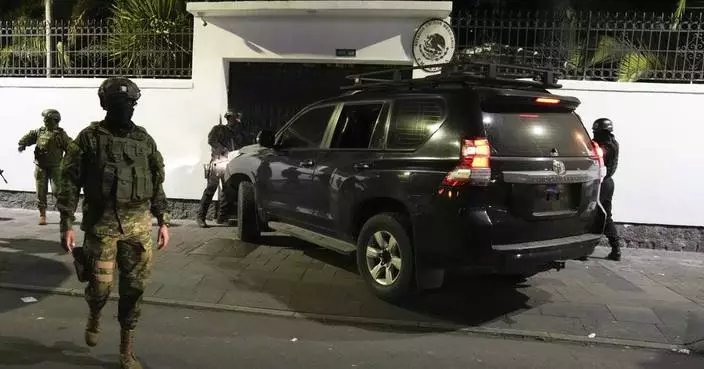North Korean leader Kim Jong Un's summits with the presidents of South Korea and the United States have not changed his country's abysmal human rights record, the U.N. independent investigator on human rights in the isolated Asian nation said Tuesday.
Speaking at a news conference, Tomas Ojea Quintana said he is "very concerned" that statements following Kim's meetings with South Korean President Moon Jae-in and U.S. President Donald Trump made no mention of human rights in North Korea.
He pointed to reports of "systematic, widespread abuses" of human rights and a U.N. commission of inquiry's findings in 2014 that possible crimes against humanity have been committed in North Korea.
"The human rights situation at the moment, at the moment, has not changed," Quintana said.
Quintana said dealing with North Korea's nuclear arsenal is extremely important for humanity, and he strongly supported rapprochement between the two Koreas and talks with the U.S. that have decreased tensions and improved prospects for peace.
But he stressed that North Korea's human rights record must not be ignored.
Quintana recalled that in his previous job as U.N. investigator in Myanmar, he raised alarm about "crimes against humanity" being committed by the military during that country's political transition in 2012 but his concerns were put aside.
"And now we see the consequences," he said, alluding to findings of military abuses against Myanmar's Rohingya Muslim minority.
He said he isn't saying the situation in North Korea is the same, but "we shouldn't undermine the principle of human rights because sooner or later it will come back."
"As the process of rapprochement and talks are moving so fast, we the human rights people — we also need to move fast and bring proposals, different proposals," Quintana said.
He said one of his proposals is to ask the new U.N. human rights chief, Michelle Bachelet, to initiate "a process of engagement" with North Korea.
He also urged North Korea "to show commitment to the human rights agenda" and allow him to visit the country and talks to its leaders.
Quintana, a human rights lawyer from Argentina appointed by the Geneva-based Human Rights Council, was in New York to present his latest findings to the U.N. General Assembly's human rights committee.
He said he proposed to North Korean officials in Geneva last March that the government should start releasing political prisoners as a signal of commitment to human rights.
"We saw in the media there was an amnesty by the leadership and some prisoners were released," Quintana said. "That was very important news."
But Quintana added that when he wrote to North Korea seeking details, he got no response.
He said in response to a question that the Trump administration has told him it supports his work and backs a General Assembly resolution condemning North Korea's human rights situation.
On Monday, North Korea's official KCNA news agency accused "some dishonest forces including Japan" of "working hard to cook up" a politicized resolution on human rights. It called the annual resolution the result of a "conspiratorial and criminal scenario of the hostile forces to defame" North Korea.
KCNA said Western countries should not be held up as "the human rights standard of the world," saying that "misanthropy and abnormal way of life are rampant" in the West.
UNITED NATIONS (AP) — The world hasn’t seen anything like the unprecedented destruction of housing in Gaza since World War II, and it would take at least until 2040 to restore the homes devastated in Israel’s bombing and ground offensive if the conflict ended today, the United Nations reported Thursday.
The U.N. assessment said the social and economic impact of the war launched after Hamas’ surprise attack in southern Israel on Oct. 7 has been increasing “in an exponential manner.”
It called the level of casualties – 5% of Gaza’s 2.3 million population -- “unprecedented” in such a short time. By mid-April, it said, over 33,000 Palestinians had been killed and more than 80,000 injured. About 7,000 others remain missing, most believed to be buried under the rubble.
“Every additional day that this war continues is exacting huge and compounding costs to Gazans and all Palestinians” said United Nations Development Program Administrator Achim Steiner.
The report by UNDP and the U.N. Economic Commission for Western Asia paints a dire picture of the struggle to survive in Gaza where 201,000 jobs have been lost since the war began and the economy contracted 81% in the last quarter of 2023.
Abdallah Al Dardari, UNDP’s regional director for Arab states, told a U.N. press conference launching the report that almost $50 billion in investments in Gaza are estimated to have been wiped out in the conflict, and 1.8 million Palestinians have fallen into poverty.
Gaza has been under blockade by Israel and Egypt since Hamas’ 2007 takeover, putting tight controls on what enters and exits the territory. Even before the war, it faced “hyper-unemployment” of 45%, reaching nearly 63% among younger workers.
According to the report, the U.N. Human Development Index – which measures key issues for a long and healthy life, for gaining knowledge and for achieving a decent standard of living – has been pushed back more than 20 years in Gaza.
The “productive basis of the economy has been destroyed,” the report said, with sectors experiencing losses of more than 90%. It estimated that the GDP of Gaza could decrease by 51% in 2024.
“The scope and scale of damages have been unprecedented and still mounting as the war still rages on,” it said.
At least 370,000 housing units in Gaza have been damaged, including 79,000 destroyed completely, the report said, along with commercial buildings.
After previous Israel-Hamas conflicts, housing was rebuilt at a rate of 992 units a year, it said. Even if Israel allows a five-fold increase of construction material to enter Gaza, it would take until 2040 to rebuild the destroyed houses, without repairing the damaged ones.
Al Dardari said that after 51 days of fighting between Israel and Hamas in 2014 there were 2.4 million tons of debris in Gaza. In the current war, he said, there are already 37 tons of debris that need to be removed to make space for temporary shelters and other structures which are critical to return some sort of normalcy to Palestinians in Gaza.
“We haven't seen anything like this since 1945, since the Second World War — that intensity in such a short time, and the massive scale of destruction,” he said.
Al Dardari said the preliminary estimate of the cost of an early recovery program for three years, which would bring hundreds of thousands of Palestinians back to temporary shelters in their original locations with community support, is between $2 billion and $3 billion.
The rough estimate for the overall reconstruction of Gaza is between $40 billion and $50 billion, he said.
But Al Dardari stressed that the immediate focus now is on planning for early recovery.
He said the U.N. senior humanitarian and reconstruction coordinator for Gaza, Sigrid Kaag, and other officials met earlier Thursday with 22 U.N. agencies and went through plans by each one for the initial years after the war ends.
“We are on the verge of developing and finalizing a unified view and early recovery framework that is Palestinian-centered, Palestinian-led and owned by the Palestinian people,” Al Dardari said.
Associated Press Writer Lee Keath contributed to this report from Cairo

The unprecedented destruction of housing in Gaza hasn't been seen since World War II, the UN says

The unprecedented destruction of housing in Gaza hasn't been seen since World War II, the UN says

Palestinians look at the destruction after an Israeli airstrike in Deir al Balah, Gaza Strip, Tuesday, April 30, 2024. (AP Photo/Abdel Kareem Hana)












